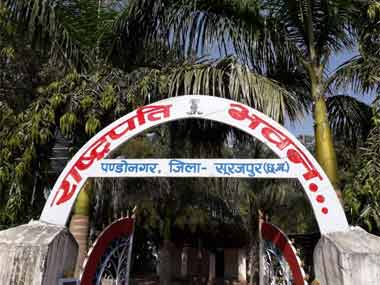Subhar Sai Pando still remembers being mesmerised by Rajendra Prasad. He was a young man when India’s first president visited his village of Pando Nagar in Chhattisgarh’s Surguja district on 22 November 1952. “Our Pando tribe used to live in forests. Rajendra Prasad rehabilitated us here,” he says with a smile on his face, deepening his wrinkles. “We were excited for our future because no less than the president had more or less adopted us.” [caption id=“attachment_5584731” align=“alignleft” width=“380”]  The ‘Rashtrapati Bhavan’ at Pando Nagar village in Chhattisgarh. Image courtesy Parth MN[/caption] Subhar, now aged 90, has lost his hearing ability a fair bit. But his memories of Prasad’s visit are sharp as ever. “It was like a festival,” he recollects, sitting across the arch in the village that reads “Rashtrapati Bhavan”. “We danced, we sang. Prasad gave us the land, wished us the best in stabilising our lives. He even stayed over in the village.” The villagers after that built and nurtured a small complex in the village to remember the occasion, and called it Rashtrapati Bhavan, thereby marking only the second place in the country with that kind of a board. The ground-storied structure inside the complex has a photograph of Prasad. Around it is a shed, a water tanker and a tree that he had planted back then. Today, Subhar has a bitter taste in his mouth as Pando Nagar – with around 150 families – reluctantly casts its vote in the Chhattisgarh Assembly Elections. “We got pattas in 1980s,” he says. “But we are still fighting to get ownership of the land. No ownership means we cannot get loans from the bank, cannot sell our harvest at cooperative societies.” In spite of several attempts over the years, the tribe has only managed to be disappointed at the hands of the local administration. Their frustration levels reached its zenith in the first week of November when they declared Pando Nagar would boycott the ongoing elections. The first phase of voting transpired on 12 November. The second, or the one where Pando Nagar cast its vote, is today on 20 November. Sanjho Pando, a middle-aged woman in the village, says they later on decided against the boycott because every vote matters. “But isn’t it sad that the people rehabilitated by India’s first ever president even have to consider it?” she asks. Every year, on 3 December, Pando Nagar celebrates the birth anniversary of Prasad. “We decorate the Rashtrapati Bhavan,” says Banarsi Pando, a resident of the village. “And cut a cake in the memory of Prasad. He was a great man, who would have been sad to know of our condition had he been alive.” And 15 kilometres from Ambikapur, Pando Nagar’s gripes are those experienced by too many tribals in the state of Chhattisgarh. Ganga Ram Paikra, Ambikapur-based tribal activist, says their case is straightforward. “If you have acquired the land before 2005, you deserve to be its rightful owner according to the law books,” he says. “But hardly has the Forest Rights Act been enforced honestly.” Sanjho, therefore, says they feel they are at the mercy of the forest officials, “who are letting us farm on our own land”. “Recently the state acquired land from some of the farmers for a godown in the village,” she adds. “They didn’t even get any compensation. How long before all of us lose our livelihood like that?” One of those who lost his land was Ahibaran Pando, 35. “I lost 7 acres of my farmland,” he says. “Now I have to rely on labour work to meet my ends.” When Ahibaran resisted, he claims the administration told him that he never owned the land for the state to compensate him. “Those in power only care for the interests of the rich,” he says. “In the entire state, the Adivasis are losing their land.” The chowk off the main road that leads to Pando Nagar is called Adani chowk. “That is where his coal is unloaded,” says Banarsi. “The goods train then transports it to wherever the mines are.” In the process, the air quality of Pando Nagar has worsened. “It has even blackened the Rashtrapati Bhavan,” says Banarsi. “Several of the villagers have breathing difficulties. The coal transportation has stopped since 1 November. But it may resume after the elections.” The villagers say the establishment has ignored them in every which way. Around 600 acres of land, out of which, people with only 250 acres have got their land rights. The political parties, they say, did not even bother to change their minds after they announced the boycott. Sanjho, who cultivates rice on her farmland, says the state does not care for Adivasis and farmers. “The minimum support price of Rs 1,750 is insufficient,” she says. “The Raman Singh government has not even given the bonus to paddy farmers for two years.” On a tranquil afternoon in Pando Nagar, not many young people were around for a chat. “There are no jobs either,” says Sanjho, upon asked where the youth is. “They have gone out in search of labour work. Those who are not locals are working here as government servants, and our kids with decent degrees are daily wage labourers.” With such blatant neglect, Banarsi asks, “Were we wrong to consider the boycott?” But no, he says, without waiting for an answer. “Not voting would have meant accepting defeat. We are part of the society, and we will have our rightful say. We will not throw in the towel just yet.”
Once hailed by India’s first president Rajendra Prasad, Pando Nagar in Chhattisgarh’s Surguja district is now disillusioned by the apathy of the state.
Advertisement
End of Article
Written by Parth MN
Parth MN is a freelance journalist based in Mumbai. He predominantly covers agriculture along with politics and current affairs. He has been awarded the Lorenzo Natali Media Prize by the European Commission. see more


)

)
)
)
)
)
)
)
)



